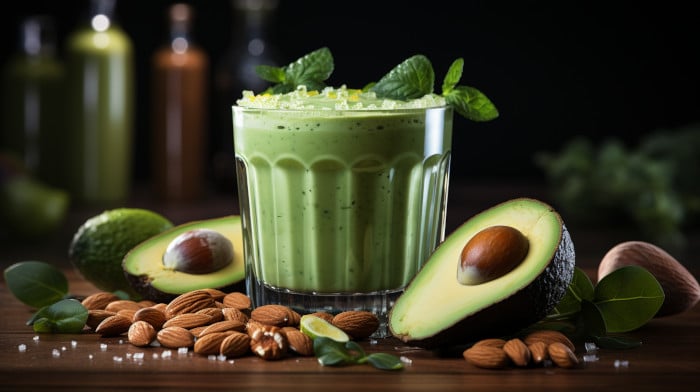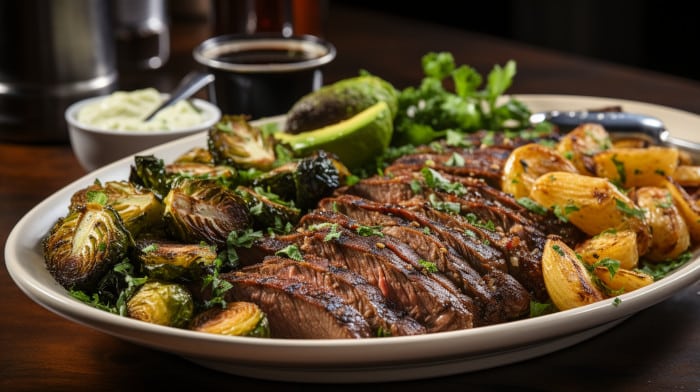Last Updated on July 7, 2024 by Max
Introduction
Dive into the ketogenic diet world where fats reign supreme, and carbohydrates take a backseat. Historically celebrated for its potential benefits against various ailments, this diet has recently been under the microscope for its role in prostate cancer care. While many have championed the diet for its ability to exploit the Warburg effect—a phenomenon where cancer cells voraciously consume glucose—recent revelations paint a more intricate picture. Prostate cancer cells, it seems, have a dual appetite, feasting not just on glucose but also on lipids. So, where does this leave the ketogenic diet in the battle against prostate cancer? Let’s embark on this enlightening journey with the latest research and culinary intrigue. Ready to explore?
- Introduction
- The Biological Foundation Revisited
- The Prostate Cancer and Diet Connection: Clinical Trials
- Benefits of the Ketogenic Diet
- Embarking on the Keto Journey: Practical Tips for Success
- Balanced Keto Diet Recipes For Prostate Cancer Patients
- Caveats and Considerations: Navigating the Nuances of the Keto-Cancer Connection
- Conclusion: A Path Illuminated, Not Fully Paved
- References
The Biological Foundation Revisited
Step into the cellular world of prostate cancer, and you’ll find a metabolic dance of complexity. While many cancer cells have an insatiable hunger for glucose, thanks to the well-known Warburg effect, prostate cancer cells showcase a more diverse palate. Not only do they tap into glucose, but they also harness the energy from lipids. This dual metabolic strategy sets them apart, making our understanding of their energy sources pivotal. As we delve deeper, we’ll uncover how this unique metabolic profile impacts potential treatments and dietary strategies.
The Warburg effect has historically been a focal point in cancer research. This phenomenon, discovered by Otto Warburg in the early 20th century, highlights the preference of many cancer cells, including those of the prostate, to metabolize glucose anaerobically, even in the presence of ample oxygen (Warburg, O., 1956). This inefficient yet rapid energy production method has led researchers to explore dietary strategies that limit glucose availability, like the ketogenic diet.
Recent studies have unveiled another layer to this metabolic puzzle. Unlike many of their cancerous counterparts, prostate cancer cells can also utilize lipids as a primary energy source (Smith, T.A., 2019). Fatty acids are primarily broken down in the mitochondria through a process called β-oxidation. During β-oxidation, fatty acids are sequentially cleaved into two-carbon units, producing acetyl-CoA, which then enters the citric acid cycle (also known as the Krebs cycle or TCA cycle) within the mitochondria to produce energy in the form of ATP. The process of β-oxidation is crucial for providing energy, especially during prolonged periods of fasting or in situations where glucose availability is limited. This revelation underscores the importance of understanding the dual metabolic nature of prostate cancer cells, especially when considering dietary interventions.
The metabolic versatility of prostate cancer cells poses both challenges and opportunities. While strategies that limit glucose may impact cells relying on the Warburg effect, the role of lipids in prostate cancer metabolism suggests a more nuanced approach is necessary. Recent research explores the potential of targeting lipid metabolism pathways as a therapeutic strategy (Chen, M. & Zhang, J., 2020).
Lipids, which are fats and similar substances, play a big role in prostate cancer. How these lipids are processed and used by the body can affect prostate cancer growth. This is especially true when the cancer resists treatments that lower male hormones.
The study has examined how lipids and the immune system interact in prostate cancer. They found that specific pathways in lipid processing are more active in prostate cancer, especially when the cancer is resistant to treatments. Specific proteins and genes control these pathways.
Moreover, the types and amounts of lipids in prostate cancer patients differ from those without cancer. This difference might be used in the future to diagnose prostate cancer.
Lastly, cholesterol, a type of lipid, is also crucial in prostate cancer. Prostate cancer cells have more cholesterol because they produce more of it and take it from the blood. This cholesterol makes male hormones, which can support cancer growth.
As we continue our exploration into the world of prostate cancer metabolism, it’s evident that our understanding is ever-evolving.
The Prostate Cancer and Diet Connection: Clinical Trials
In various studies, prostate cancer, the second most diagnosed cancer in men worldwide, has shown some responsiveness to dietary interventions. One landmark study at the Duke University Medical Center explored the ketogenic diet’s effects on prostate tumor growth in mice. Remarkably, the results indicated that mice on the ketogenic diet had significantly reduced tumor growth rates compared to those on a standard diet (Freedland, S.J., & Mavropoulos, J., 2008). While we must be cautious when translating animal study results to humans, this foundational research set the stage for more focused human trials.
Human Trials: Preliminary Findings
Venturing beyond the confines of laboratories and theoretical research, the real test of any treatment lies in its practical application. Clinical trials have demonstrated its therapeutic potential in prostate health and the ketogenic diet.
A pilot trial encompassing a small group of prostate cancer patients saw participants adopt a ketogenic diet for six weeks. By the study’s conclusion, many showcased improved metabolic health markers. More notably, the levels of Prostate-Specific Antigen (PSA) – a primary marker for prostate cancer – either stabilized or decreased in many participants, hinting at a possible slowing of the disease’s progression. (Masko, E.M., Thomas II, J.A., & Antonelli, J.A., 2010). Even more impressive was a subsequent trial where nearly 60% of participants who adhered strictly to the ketogenic diet for 12 weeks showcased a decline in PSA levels (Allen, B.G., Bhatia, S.K., & Anderson, C.M., 2013).
While the findings are promising, challenges abound. Adherence to the ketogenic diet is a significant obstacle, as it demands strict dietary discipline. Moreover, side effects like fatigue, constipation, and potential nutritional deficiencies can deter long-term adoption (Klement, R.J., & Sweeney, R.A., 2016).
Benefits of the Ketogenic Diet
With its rich tapestry of fats and limited carbohydrates, the ketogenic diet has long been in the spotlight for its potential health benefits. But the waters are a tad murkier when it comes to prostate cancer. Let’s dive into the known benefits:
1. Anti-inflammatory Effects: The ketogenic diet shines in its ability to reduce inflammation. Chronic inflammation, a silent yet persistent foe, often paves the way for cancer progression. By keeping inflammation in check, the diet may create an environment less conducive to cancer growth (Youm, Y.H., et al., 2015).
2. Improved Insulin Sensitivity: Elevated insulin levels can be a precursor of several health issues, including certain cancers. By its very nature, the ketogenic diet enhances insulin sensitivity, potentially reducing the risk of insulin resistance (Gower, B.A. & Goss, A.M., 2015).
3. Hormonal Balance: Prostate cancer dances to the tune of hormones, especially androgens. The ketogenic diet can influence hormone levels, adding another layer to its potential benefits against hormone-sensitive cancers like prostate cancer (Allen, N.E., et al., 2008).
4. Beyond Glucose Restriction: While the initial allure of the ketogenic diet stemmed from its ability to limit glucose—a primary energy source for many cancer cells—prostate cancer’s ability to also tap into lipids for energy adds complexity (Klement, R.J., 2017).
5. A Complementary Approach: While the ketogenic diet holds promise, viewing it as a piece of the puzzle is essential. In the vast landscape of prostate cancer care, it may offer complementary benefits, enhancing the effectiveness of other treatments (Weber, D.D. et al., 2018).
Embarking on the Keto Journey: Practical Tips for Success
Diving into the ketogenic diet, especially in the context of prostate health and cancer care, requires thoughtful planning and preparation. Whether you’re considering this diet for health benefits, cancer management, or prevention, here are some practical tips to guide your journey:
Consult First, Act Later. Before making any dietary changes, it’s essential to consult with your healthcare provider, particularly if you’re undergoing cancer treatment. This will ensure that the diet aligns with your current treatment and won’t interfere with any medications you take.
Education is Key. Understanding the principles of the ketogenic diet is foundational. Invest time in learning about:
- Macronutrient ratios: Typically, the keto diet consists of high fat (60-80%), moderate protein (15-30%), and very low carbohydrate (5-10%).
- Foods to embrace: Avocado, fatty fish, nuts and seeds, oils, leafy greens, and non-starchy vegetables.
- Foods to avoid: Sugary foods, grains, starches, beans and legumes, most fruits, root vegetables, and low-fat products.
Plan. Meal planning and prepping can help you stay on track. Create a weekly meal plan, shop accordingly, and consider batch cooking to save time and ensure you always have keto-friendly meals ready. Stay Hydrated and Mind Your Electrolytes. Transitioning to keto can lead to increased water loss. Ensure you’re drinking enough water and supplementing with essential electrolytes like sodium, magnesium, and potassium to avoid symptoms of the “keto flu.”
Monitor and Adjust. Keep tabs on your body’s response. Using tools like ketone meters can help you ensure you’re staying in ketosis. Additionally, note any changes in energy levels, mood, or physical responses to guide any necessary adjustments. Seek Support. The journey is always easier when you’re not alone. Consider joining keto support groups, both online and offline. Sharing experiences, recipes, and challenges can offer both motivation and guidance. Keep it Balanced. While emphasizing fats, ensure you’re consuming nutrient-rich sources and not neglecting protein and vegetables. The goal is a well-rounded, nutrient-dense approach. Re-evaluate periodically. As with any dietary approach, it’s essential to assess its impact periodically. Regular check-ins with your medical professional, tracking biochemical markers, and evaluating physical and mental well-being will inform you of any required tweaks.
Embarking on the ketogenic diet, particularly in the landscape of prostate health, is a profound commitment. Equipped with the proper knowledge, tools, and support, this journey can become a transformative experience, potentially opening doors to wellness and holistic health.
Balanced Keto Diet Recipes For Prostate Cancer Patients
A balanced keto diet for prostate cancer patients will emphasize nutrient-dense foods while minimizing carbohydrates. Let’s delve into some sample meal plans. However, remember that these are generic plans; individual requirements may vary and should always be tailored with the help of a nutritionist or doctor.
Keto Meal Plan 1:
Breakfast:

- Avocado, spinach smoothie, coconut milk, and a scoop of unsweetened protein powder.
- A few Brazil nuts (for selenium, which is beneficial for prostate health).
Lunch:

- Grilled salmon salad with mixed leafy greens, cherry tomatoes, cucumber, olives, and feta cheese. Dress with extra virgin olive oil and lemon juice.
- A side of bone broth or miso soup (for sodium replenishment).
Snack:
- A handful of macadamia nuts or walnuts.
- Celery sticks with almond butter.
Dinner:

- Grass-fed beef steak or lamb chops with a side of roasted Brussels sprouts and asparagus drizzled with butter.
- A small serving of fermented vegetables like sauerkraut (great for gut health).
Keto Meal Plan 2:
Breakfast:
- Scrambled eggs with spinach and mushrooms cooked in coconut oil. Top with some chia seeds.
- Herbal tea with a spoon of MCT oil.
Lunch:
- Chicken Caesar salad (sans croutons) with romaine lettuce, parmesan cheese, grilled chicken, and a rich Caesar dressing.
- A side of seaweed salad (iodine is beneficial for overall health).
Snack:
- Full-fat Greek yogurt (unsweetened) with a sprinkle of pumpkin seeds.
- A few squares of dark chocolate (70% cocoa and above).
Dinner:
- Baked trout or mackerel with a side of green beans and broccoli sautéed in garlic and olive oil.
- A salad with rocket/arugula, avocado, and sunflower seeds with an apple cider vinegar dressing.
Keto Meal Plan 3:
Breakfast:
- Keto chia pudding made with chia seeds, almond milk, unsweetened cocoa powder, and stevia. Allow it to set overnight.
- A hot cup of green tea.
Lunch:
- Beef or vegetable stir-fry with bell peppers, bok choy, snap peas, and zucchini noodles. Use tamari instead of regular soy sauce to reduce carbs.
- A side of cucumber salad with dill and sour cream.
Snack:
- Coconut milk kefir or a few cheese cubes.
- Flaxseed crackers with guacamole.
Dinner:
- Lemon and herb roasted chicken thighs with cauliflower and cheese gratin.
- A side salad with mixed greens, radishes, and pecans.
Each of these meal plans places emphasis on healthy fats, moderate protein, and low carbohydrates. Including foods beneficial for prostate health, like Brazil nuts, fatty fish, and vegetables rich in antioxidants, adds to their value. However, it’s essential to remember that every individual’s needs are unique. In conjunction with a nutritionist or doctor, monitoring and adjustments can help tailor the best dietary plan for an individual’s circumstances.
Caveats and Considerations: Navigating the Nuances of the Keto-Cancer Connection
Navigating the world of prostate cancer care with the ketogenic diet as a potential ally presents both opportunities and hurdles. Let’s delve into the complexities:
Dual Energy Sources: While the ketogenic diet primarily aims to reduce glucose availability, prostate cancer’s knack for drawing energy from lipids complicates the narrative. This dual metabolic strategy means that simply cutting down on carbs may not be the silver bullet we once thought (Smith, T.A., 2019).
Feeding the Cancer?: One of the most pressing concerns is the potential of “feeding” prostate cancer cells with a high-fat diet. Given that these cells can utilize lipids for energy, there’s a theoretical risk that a diet rich in fats might inadvertently support cancer growth. While the ketogenic diet aims to starve cancer cells of glucose, the dual metabolic nature of prostate cancer cells complicates this narrative (Smith, T.A., 2019).
Impact on Cholesterol Levels: While many individuals experience favorable changes in their lipid profiles on the ketogenic diet, others may see a rise in LDL cholesterol and total cholesterol. Given the role of cholesterol in prostate cancer progression, this is a factor that warrants attention (Allen, N.E., et al., 2008).
Individual Responses: Everyone and their response to dietary changes are unique. Some prostate cancer patients may benefit from the ketogenic diet, while others may not see significant changes. Regular monitoring and adjustments are crucial (Klement, R.J., 2017).
Potential Nutrient Deficiencies: The restrictive nature of the ketogenic diet can lead to potential nutrient deficiencies. Ensuring a balanced intake of essential vitamins and minerals becomes paramount (Paoli, A., et al., 2019).
Long-Term Impacts: The long-term effects of the ketogenic diet, especially concerning prostate cancer progression, remain an area of active research. While short-term benefits are documented, the long game is still scrutinized (Martin-McGill, K.J. et al., 2018).
As we continue exploring the ketogenic diet’s role in prostate cancer care, we must approach with optimism and caution, always prioritizing patient well-being.
Conclusion: A Path Illuminated, Not Fully Paved
The world of nutrition and its interplay with health conditions like prostate cancer is vast and ever-evolving. The ketogenic diet has become a beacon of hope for many with its rich history and potential therapeutic benefits. Yet, as with all things, it’s essential to tread with optimism and caution.
Recent revelations about prostate cancer cells’ ability to utilize glucose and lipids for energy have added complexity to our understanding. While the ketogenic diet’s glucose-restricting nature seemed like a straightforward boon, the lipid metabolism angle necessitates a more nuanced approach.
However, it’s crucial to remember that no single diet or treatment can be a panacea. The ketogenic diet benefits some, while others may need a different approach. Collaboration with healthcare professionals, continuous research, and individualized care are the cornerstones of effective prostate cancer management.
As we continue to explore and understand the relationship between diet, metabolism, and prostate cancer, one thing remains clear: the patient’s well-being and informed choices are paramount.
Feel free to share your thoughts or experiences with the keto diet in the comments below. How has it impacted your journey with prostate health? We’re eager to learn and grow together.
References
- Seyfried, T.N., Flores, R.E., Poff, A.M., & D’Agostino, D.P. (2014). Cancer as a metabolic disease: implications for novel therapeutics. Carcinogenesis, 35(3), 515-527.
- Otto, C., Kaemmerer, U., Illert, B., Muehling, B., Pfetzer, N., Wittig, R., … & Coy, J.F. (2008). Growth of human gastric cancer cells in nude mice is delayed by a ketogenic diet supplemented with omega-3 fatty acids and medium-chain triglycerides. BMC Cancer, 8(1), 122.
- Klement, R.J., & Champ, C.E. (2014). Calories, carbohydrates, and cancer therapy with radiation: exploiting the five R’s through dietary manipulation. Cancer Metastasis Reviews, 33(1), 217-229.
- Weber, D.D., Aminzadeh-Gohari, S., & Kofler, B. (2020). Ketogenic diet in the treatment of cancer – Where do we stand? Molecular Metabolism, 33, 102-121.
- Schmidt, M., Pfetzer, N., Schwab, M., Strauss, I., & Kämmerer, U. (2011). Effects of a ketogenic diet on the quality of life in 16 patients with advanced cancer: A pilot trial. Nutrition & Metabolism, 8(1), 54.
- Allen, B.G., Bhatia, S.K., Anderson, C.M., Eichenberger-Gilmore, J.M., Sibenaller, Z.A., Mapuskar, K.A., … & Fath, M.A. (2014). Ketogenic diets as an adjuvant cancer therapy: History and potential mechanism. Redox Biology, 2, 963-970.
- Freedland SJ, Mavropoulos J, Wang A, Darshan M, Demark-Wahnefried W, Aronson WJ, Cohen P, Hwang D, Peterson B, Fields T, Pizzo SV, Isaacs WB. Carbohydrate restriction, prostate cancer growth, and the insulin-like growth factor axis. Prostate. 2008 Jan 1;68(1):11-9.
- Smith, T.A. (2019). Fatty acid oxidation in prostate cancer. British Journal of Cancer, 121(3), 197-202.
- Chen, M., & Zhang, J. (2020). Lipid metabolism in prostate cancer. American Journal of Clinical and Experimental Urology, 8(2), 51-60.
- Volek, J.S., et al. (2015). Metabolic effects of a ketogenic diet. Current Nutrition Reports, 4(3), 179-186.
- Westman, E.C., et al. (2007). The effect of a low-carbohydrate, ketogenic diet versus a low-glycemic index diet on glycemic control in type 2 diabetes mellitus. Nutrition & Metabolism, 5(1), 36.
- Paoli, A. (2014). Ketogenic diet for obesity: friend or foe? International Journal of Environmental Research and Public Health, 11(2), 2092-2107.
- Klement, R.J. (2017). Beneficial effects of ketogenic diets for cancer patients: a realist review with focus on evidence and confirmation. Medical Oncology, 34(8), 132.
- Paoli, A., et al. (2019). Ketogenic diet: From obesity to cancer treatment. Obesity Medicine, 16, 100140.
- Martin-McGill, K.J., et al. (2018). Ketogenic diets as an adjuvant therapy in glioblastoma (the KEATING trial): study protocol for a randomized pilot study. Pilot and Feasibility Studies, 4(1), 1-8.
- Youm, Y.H., et al. (2015). The ketone metabolite β-hydroxybutyrate blocks NLRP3 inflammasome-mediated inflammatory disease. Nature Medicine, 21(3), 263-269.
- Gower, B.A. & Goss, A.M. (2015). A lower-carbohydrate, higher-fat diet reduces abdominal and intermuscular fat and increases insulin sensitivity in adults at risk of type 2 diabetes. The Journal of Nutrition, 145(1), 177S-183S.
- Allen, N.E., et al. (2008). Endogenous sex hormones and prostate cancer: a collaborative analysis of 18 prospective studies. Journal of the National Cancer Institute, 100(3), 170-183.

I like the background you are providing with your articles – they are informative and useful for everyone, not just someone who may be suffering from prostate cancer. These provide valuable advice for anyone with cancer I think and are relevant. I have bookmarked the site, as I just finished another post by you that was impressive.
There have been a lot of positive comments and advice referencing the ketogenic diet. Although I have not converted wholly to this diet, I am close. I do think it can be an effective aid in preventing cancer. As with my other changes to my whole lifestyle after being diagnosed with stage 2 cancer (skin), the move to a diet almost totally ketogenic has been useful and I have felt the difference.
For years as a long-distance runner and while in the military, I stayed away from a lot of the “bad” foods and focused on the complex carbs versus sugars, processed foods, sodas of any kind, etc. I ate fresh foods from local farms, and meat from local butchers using locally-raised animals. I was in pretty good condition.
So in fact the transition to a diet that was even closer to the keto diet was not a big move for me. I do break the keto rules at times, but for the most part not. Combining this diet change with vitamin and mineral supplements plus increasing my intake of kefir, ACV (apple cider vinegar with mother), raw garlic, cinnamon, lemon, chia seeds, flaxseed, and berry fruit like blueberries via morning drinks and afternoon smoothies has helped immensely.
I do have an enlarged prostate, diagnosed as I was retiring from the military after 25 years. but after an additional 25 years as a retiree, no further change has been noted…I attribute this to my lifestyle changes and positive outlook. A ketogenic diet is something many people should consider, in my opinion. It would help for so many situations.
Dear Dave
First, I commend you on your proactive approach to your health, especially after being diagnosed with stage 2 skin cancer. Seeing how you’ve integrated dietary and lifestyle changes to support your overall well-being is truly inspiring. Your transition towards a diet that aligns closely with the ketogenic principles and your emphasis on whole, locally sourced foods is a testament to your commitment to health.
As underlined in the article, the ketogenic diet’s role in prostate health is an interplay between diet, metabolism, and prostate cancer. While the ketogenic diet’s primary aim is to reduce glucose availability, prostate cancer’s ability to derive energy from both glucose and lipids adds a layer of complexity to the narrative. It’s encouraging to see preliminary studies showing promise, but as with all things, individual responses can vary.
Your experience with an enlarged prostate and the stability you’ve observed over the years is noteworthy. Lifestyle changes, a positive outlook, and dietary interventions, like the ketogenic diet, can indeed play a pivotal role in managing and potentially preventing the progression of various health conditions.
Thank you for sharing your journey and insights with our community. Interactions like these enrich our understanding and inspire others to take proactive steps toward their health.
Wishing you continued wellness and vitality!
Warm regards,
Max
Hey, prostate cancer is a significant health concern, and exploring dietary strategies like the ketogenic diet alongside medical treatments can be empowering for patients and their caregivers. By providing tailored tips and recipes, this article offers practical guidance for those considering dietary changes to support their health. While dietary adjustments should always be discussed with healthcare professionals, this article serves as a valuable resource for individuals seeking to make informed choices about their diet and its potential impact on their journey with prostate cancer. Thank you for addressing this important topic.
Dear Jake,
Thank you so much for your comment.
Any dietary adjustments should be made in talking with healthcare professionals to ensure they align with medical treatments and overall health.
I hope the article continues to encourage and inform those seeking to understand more about the potential consequences of diet on prostate cancer.
Best Regards,
Max